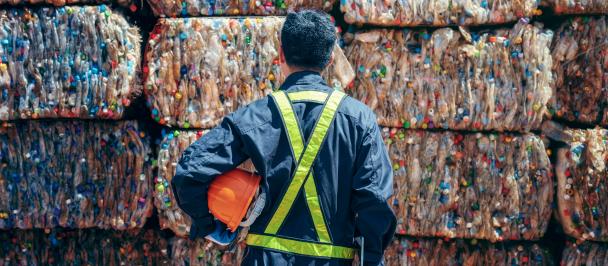
Plastic Pollution
Plastic is all around us. It's in the water we drink, the food we eat, and the air we breathe. Tackling plastic pollution along the entire lifecycle is critical to protecting human and planetary health and safeguarding sustainable development.
Global Context
Every year, the world produces around 430 million metric tons of new plastic. If we proceed on this trajectory, global plastics use is expected to nearly triple by the year 2060.
The way we currently produce and consume plastics is extremely wasteful: we extract oil and gas to produce plastics that we often only use once before discarding them as waste. As a result, most of the world's plastic waste – a staggering 79 percent – has accumulated in landfills or nature. About 12 percent has been incinerated. Less than 10 percent has been recycled. The consequences of this linear take-make-waste model are dire:
Plastic pollution drives nature loss and destroys important ecosystems. Every year, millions of tons of plastics leak into the environment damaging critical habitats, injuring and killing wildlife and impeding essential biological processes. Research suggests plastic pollution affects of 88 percent marine species.
Plastic pollution fuels the climate crisis. Plastics are made from fossil fuels and the plastics industry is the fastest-growing source of industrial greenhouse gases. In 2019 alone, plastic production and incineration resulted in greenhouse gas emissions equal to the emissions from 189 coal power plants. If not curbed, plastic pollution could prevent us from limiting global temperature rise to 1.5C.
Plastic pollution threatens human health. Plastic poses risks to human health at every stage of its lifecycle. Researchers have found plastic particles throughout the human body, including in people's lungs, in breast milk and in blood. From oil extraction and plastic production to product use, recycling and disposal, harmful substances can be released and disrupt our immune and hormone systems, cause cancers or result in other health impacts.
It's clear we must radically transform the way we produce, consume and dispose of plastics. Governments are currently negotiating a global plastics treaty that could jumpstart this complex systems shift.
UNDP's Service Lines
Around the world, UNDP is working towards turning off the tap and eliminating plastic pollution at the source. Realizing this vision means challenging business-as-usual and tackling plastic pollution along its entire lifecycle. Intervention areas include:
- Policy and regulation: supporting governments in developing and implementing policy instruments including single-use plastic bans, Extended Producer Responsibility (EPR), import and export restrictions, and creating an enabling environment to address plastic pollution in an integrated lifecycle approach.
- Innovation and technology: incentivizing and scaling up innovative solutions, including sustainable business models, alternative delivery systems and ecological alternatives in key sectors such as packaging, tourism, and textiles.
- Waste management: supporting municipal governments in eliminating plastic waste leakage and improving waste management systems, including through improving business operations, formal collection schemes, and working with the informal sector.
- Capacity development and knowledge management: building capacities, boosting behavior change, and establishing knowledge networks at all levels to help governments in their journey towards ending plastic pollution.

 Locations
Locations



